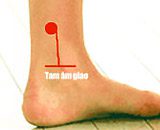Traditional Chinese medicine (TCM) suggests that to prevent and treat insomnia, it is essential to nourish the yin blood and regulate the three organs: heart, liver, and spleen. Stimulating specific acupoints such as Baihui, San Yin Jiao, and Neiguan can enhance sleep quality.
 |
|
San Yin Jiao Acupoint |
According to traditional medicine theories, insomnia originates from deficiencies in yin blood. Any factors that lead to a depletion of yin blood or insufficient essence to nourish the heart and mind can result in insomnia or sleep disturbances. Hải Thượng Lãn Ông believed that insomnia is caused by insufficient yin blood, affecting the three organs: heart, liver, and spleen.
Acupressure Techniques for Insomnia:
San Yin Jiao Acupoint: Located 3 inches above the inner ankle bone, close to the back edge of the tibia. Its function is to nourish yin and regulate blood.
Neiguan Acupoint: Found at the midpoint of the inner wrist line, measured up 2 inches; it helps calm the spirit…
Baihui Acupoint: Located at the top of the head, 5 inches above the hairline on the forehead, at the indentation in the center of the head.
Yintang Acupoint: Situated at the midpoint of the eyebrow ridge, it calms the mind, clears heat, soothes the spirit, and treats insomnia.
You can perform acupressure on these points once or twice daily to help prevent and treat insomnia. This method is highly effective and poses no harm. Additionally, it is advisable to use herbal supplements that nourish yin blood, limit salty, dry, and hot foods that are not beneficial for yin blood, and avoid stimulants such as coffee, strong tea, tobacco, and alcohol. It is recommended to consume light meals, avoid overeating, and engage in gentle walking or light exercise to clear the mind before bedtime.
















































